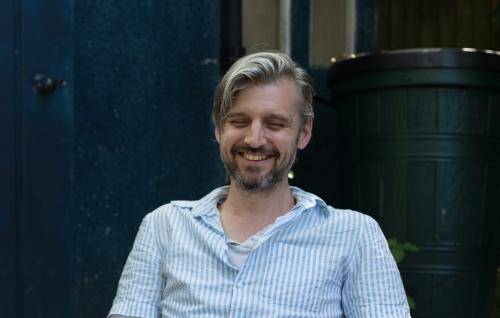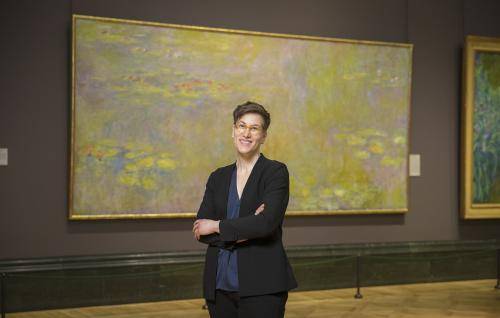I Was There: 1 - The Soldier
I Was There: 1 - The Soldier
Biblical Scholar Dr Paula Gooder reflects on different characters who witnessed the events of Holy Week and Good Friday.
The Soldier
I was there…I didn’t want to be.
I still can’t believe they made me go but I was there. Passover had started already. We were meant to be guarding the temple. Being a temple guard was a noble job handed down in my family from generation to generation, my grandfather said we could trace our family back to Levi himself, though every time he said it my mother snorted a little and rolled her eyes. I don’t care what she thinks, I Jacob benLevi I am a temple guard and proud of it. At least I was until then. Our job was to keep watch over the doors and gates to make sure no one got in who shouldn’t, especially not a Roman and knowing them they would have been trying to. Keeping order in the temple – that was our job – not trekking outside of the city walls to do something we could have done days ago.
Passovers are never easy at the temple. Three times as many people as normal cram into the city from north and south and west and east, bringing with them strange accents and smells; expectations and long held grudges; hopes and resentments; joy and rage. They bring everything to the temple with their worship – as they should – but it falls to us, the temple guards, to keep them all in line.
This year was worse than ever. The air was thick with tension. It felt as though every corner I turned revealed small a group of scribes or Pharisees huddled together whispering their outrage to one another. Occasionally I even caught sight of Caiaphas, the chief priest or Annas, his father-in-law and the previous chief priest, right at their heart their faces proclaiming indignation more eloquently than words could ever do.
It all began a week ago, though my friend tells me it started far earlier than that among those pesky Galileans – that’s where trouble always starts. But last Sunday, I was standing at my post like I usually do when I heard shouts and singing. At first I thought nothing of it, the pilgrims to the temple often sang Psalms but then it began to draw my attention. There was something: something about the quality of it; something about the sound of their voices that suggested it was different. They were more excited, more animated than usual. I exchanged a look with my fellow guard – he rolled his eyes and we braced ourselves for trouble ahead. It’s not as though we don’t want to drive the Romans out, if we thought we had any chance at all we’d sign up tomorrow but the constant bee stings of unrest make the Romans grumpy – and when the Romans are grumpy it was people like us who suffered.
The week went from bad to worse. The next day I was patrolling like usual in the temple courts when this bloke – Galilean I’d say from his accent – stormed in and started kicking over the tables of the money changers, driving out sheep and cattle, setting doves free. It was pandemonium. You could barely hear him over the sound of the baaing and the mooing and the flapping of wings and the shouts of disgust but I could swear I heard him saying something about my house being a house of prayer and us making it a den of robbers. I think it was a bit of the Scriptures but I barely had time to think about it. You can guess who got blamed for it – I swore there and then that if I ever saw that trouble maker again, he would pay for it.
Imagine how I felt then, when the next day, I was patrolling again through the court of the Gentiles making sure there was no one else likely to kick off like he did, when I saw him, large as life holding forth to a crowd of people. The cheek of the man! I started forward to arrest him but felt someone grab me from behind and I spun round to find myself face to face with Caiaphas. I was speechless. I’d only seen him at a distance before and certainly never spoken to him, we Levites did not mix much with priests – let alone the Chief Priest. He shook his head, ‘Leave him, it’s far too dangerous with a crowd like this’.
So I did. Every day he came in. Every day we just let him go. Every day I stood and glowered at him; every day he looked over the crowds head right at me and nodded. It was as though he knew – but not only that, it was though he knew something I didn’t and was saying – be patient, have courage.
And then, when Passover had begun, late in the evening, after everyone had had their Passover meal we were suddenly summoned by Caiaphas. All of the temple guards – all at once. There was a strange man there – wait.. he wasn’t that strange I’d seen him every day, near that trouble maker. ‘Follow Judas’ was all Caiaphas said. So we went, leaving our posts at that most important time of the year. All of us: leaving the temple unguarded, uncared for. I don’t know what my grandfather would have said – actually now I think about it I know exactly what he would have said and Caiaphas would not have liked it.
But still we went. Through the dark streets of Jerusalem we marched. You could still hear the end of meal Passover psalms echoing through the quiet streets. We marched on through the gate of the city and across the valley to the garden where they kept the olive press for the olive trees that grew up the side of the mountain. By then, I wasn’t the only one who was murmuring under my breath. ‘What are we doing?’, the muttering rippled backwards and forwards through the crowd. The only silent one was Judas. He seemed nervous, ill-at-ease but he ignored us and walked on through the gloom.
At last we came to a sudden halt before a small group of people, and there he was. Right in the middle of them, that trouble maker, my trouble maker. Judas stepped up to him and kissed him.
‘Who are you looking for?’ he asked us.
The muttering rippled forwards once more but this time bearing a name ‘Jesus of Nazareth’. And then he looked at me, like he had every day that week, looked over the heads of the crowd and nodded.
‘I am he’.
It felt as though my heart stopped for a moment. My whole body trembled and the ground slipped from under me. A moment later we were all stumbling back to our feet and arresting him – which it turned out was why we had done the unthinkable and left our posts in the temple, that night of all nights.
I was jubilant. Or at least I thought I should be. I tried to be. We’d done what should have been done days ago but then, it turned out, I wasn’t pleased at all. And try as I might I couldn’t feel differently. Even now, all these years later, I look back and wonder what might have happened if we done it earlier or not at all. Even now I can’t feel easy about what happened.
I was there. I wish I hadn’t been.







